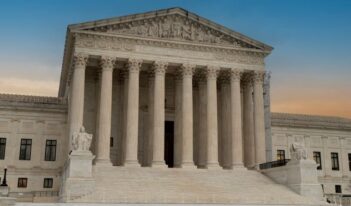
Creating an anti-racist administrative state requires confronting and dismantling historic, systemic racism.
Recent events highlight the difficulty in eradicating racial inequality from within regulatory agencies, their policies, and related professional practices.
Black, Indigenous, and other people of color (BIPOC) experience oppression due to their identities and the impact of historic harms—discriminatory laws, policies, and practices. These harms affect public perception of governmental institutions and their public administrators. In the face of these harms, equity presents a guiding light, and courageous followership presents a path forward to promote change and to address the growing lack of public trust and confidence in American institutions and their public servants.
Government, with its traditional values of economy, efficiency, and effectiveness, is in the business of producing and delivering services to promote the general well-being of the population it serves. Central to this effort are regulatory agencies. These public agencies are created by a legislature to implement and enforce specific laws to safeguard the public from harm. In theory, they serve as organizational structures that support and sustain a fair and just democratic society.
Bringing the theory of regulatory agencies as protectors of the public into reality requires public administrators. As public servants, public administrators focus on the timeworn yet salient question asked by President Woodrow Wilson: “How should the law be administered?”
This administrative question contrasts with the political one posed by President Wilson: “Who shall make law and what shall it be?” This distinction highlights the separation of politics from administration. As a result, public administrators have traditionally been trained to operate based on a framework of administrative responsibility and accountability, where governmental agencies and their administrators should be responsive and accountable to elected officials who formulate policies and remain neutral in matters that lie beyond the implementation of policies.
Racism in America presents an ongoing challenge. America has a complicated and contradictory past. As a nation, it was “founded” on an ideal that all men were created equal, while putting policies and practices in place to eradicate the existence of an Indigenous population and perpetuate the transgenerational enslavement of persons of African descent. This Janus-faced tactic reflected the best of times for some and the worst of times for others. This duplicity brings into view two focal concepts—administrative evil and administrative racism—that reflect the systemic and institutionalized nature of racial inequality and racism within the past and present administrative state.
Discriminatory policies and dystopian professional practices are part and parcel of the American legal landscape. Recent scholarship highlights the interconnectedness of these maladies across policy domains. These malicious actions of government are based on the social construction of targeted, marginalized, and otherized populations and have unveiled evil and racism throughout the policymaking process.
The concepts of administrative evil and administrative racism expose how racial inequality can manifest every day within regulatory agencies. Administrative evil is a type of organizational evil that is formal, rational, and efficient in its application toward stigmatized or dehumanized populations. Often described as being hidden or masked, administrative evil is dependent on intentional actors—those who intentionally formulate pernicious policies—and functional actors—those who implement such policies.
As a result of administrative evil, harm happens, and when this harm is racialized, it brings into focus the concept of administrative racism. This type of racism, like administrative evil, emerges from socially constructed beliefs and norms that are reinforced by political constructions or policies and that impact bureaucratic practices and behaviors. Consequently, racial inequality, as well as institutionalized and systemic racism, continue within American society.
The recent, untimely, and uncalled for deaths of Ahmaud Arbery, George Floyd, Erik Salgado, Breonna Taylor, Andrés Guardado, Daniel Prude, and others highlight the lasting legacy of racial injustice and inequality, especially in the context of the criminal justice system. Their deaths reinforce that justice is not colorblind. Beyond the racial pandemic of violence in police-community relations during 2020, an additional pandemic—COVID-19—also impacts BIPOC disproportionately.
To many observers, the problems of 21st century America, like the problems of America during preceding centuries, continue to lie along “the color line.” Disparities along the color line, however, are not limited to those created by one type of regulatory agency, charged with safeguarding all members of the public. As police violence and the disproportionate impact of COVID-19 demonstrate, administrative evil manifests in the state-sponsored harm against BIPOC people and persists within multiple facets of the administrative state.
The problem of othering endures and impedes efforts to create an inclusive society where all people belonging is universally valued. This predicament of othering impacts public trust and confidence in the institutions and employees of government. Recent Gallup poll findings have noted the growing public distrust and dissatisfaction with the criminal justice system and policing.
Of special interest is the difference in confidence in institutions between white and Black Americans. In 2020, 56 percent and 24 percent of white adults, compared to 19 percent and 11 percent of Black adults, expressed “a great deal” or “quite a lot of confidence” in police and the criminal justice system, respectively. The level of discontent seems to have a silver lining, however. A majority of Americans now see the need for major police reform and other changes to address systemic and institutionalized issues that result in racial disparities and inequalities.
But racial inequality continues to be a problem in American society, as racism persists and challenges America’s aspirational efforts to form a more perfect union.
So, how do we begin to form a more perfect union from here? How do we reimagine and reorient regulatory agencies when considering their injurious legacy that lies at the confluence of administrative evil and administrative racism?
A response to these questions requires a recognition of and appreciation for a new value of government—equity—and specifically social equity, which has been described as the “fourth pillar of public administration.” Equity and social equity emphasize the fair, just, and equitable administration and management of institutions in serving the public, and as such, provide a guiding light. But what about the path forward?
We offer the concept of courageous followership as the path to promote change and address the growing lack of public trust and confidence in American institutions and their agents.
Courageous followership draws attention to the untapped and under-appreciated power of followers to protect the people that their organizations serve. This notion underscores the importance of leaders and followers orbiting around the mission and values of their organization. Courageous followership focuses on the responsibility of followers to assume responsibility, challenge leaders, participate in organizational transformation, take moral action, and speak truth to hierarchical power to ensure that all members of the public are served in a fair, just, and equitable manner.
In rethinking regulatory law, policies, agencies, and practices, we must continue to examine the past to understand the present and plan for the future. The administrative evil and racism of America’s past impacts contemporary America through its institutions and agents.
As we continue to engage in the Sisyphean task of seeking to form a more perfect union, the challenge for public agencies and their administrators is to reject the role of being functional actors in efforts that are evil and racist. Instead, public actors must embrace the opportunity to lead as courageous followers when necessary. The new administrative state is dependent on regulatory agencies and public administrators who are anti-racists and who seek to create and promote a fair, just, and equitable approach to public administration to safeguard those who have traditionally been seen as the least of these within our society. Being not-racist is not enough!
This essay is part of a series entitled Racism, Regulation, and the Administrative State.





